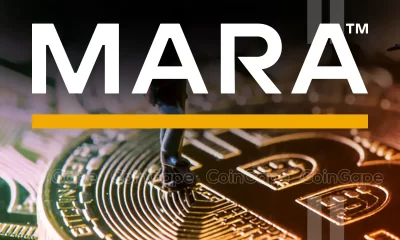Takes
Wall Street Isn't Bitcoin Only – More Crypto ETFs Are Coming
Published
2 months agoon
By
admin
Nothing stops this train.

No, I’m not talking about the Federal Reserve money printer, I’m talking about the string of ETF announcements from Wall Street and the related crypto firms servicing it this week.
I’m talking about today’s hybrid Ethereum-Bitcoin ETF, yesterday’s XRP ETF, and what will likely be 2025’s basket memecoin ETF offering exposure to everything from PEPE to GIGA to HarryPotterObamaSonic10Inu.
If you’re takeaway from the arguably dismal ETH ETF launch is that there won’t be more crypto ETFs, I’m sorry but you’re looking past the $1 trillion price tag on the rest of the crypto industry.
Wall Street wants to sell products that make U.S. dollars, and they will continue to do things that make dollars.
OK, in a bear market, maybe that’s not an Ethereum ETF. But it’s hard to imagine that in a world where the U.S. regulatory environment continues to become “more advantageous to the industry,” and there aren’t 15 to 20 of these ETFs all pumping in a bull market.
Maybe you’ve forgotten how in 2017 XRP pumped to $4 or DASH to $700, how in 2021, JPEGs sold for hundreds of millions. Newsflash: 80% of ETF purchasers are retail buyers, and that’s according to Blackrock.
Maybe you think all our proselytizing to the likes of Rick Rubin has seeped somehow into the collective consciousness. Maybe you’re betting on Kamala Harris getting elected, and that she will continue to let Gary Gensler and the SEC run roughshod over crypto.
Fair enough. That’s not a world I see. The Bitcoin-crypto voter constituency is here, and whether it delivers the election to Donald Trump, or it wins concessions from the Harris administration, that means more ETFs, not less. Certainly not a world where there’s only a Bitcoin ETF anytime soon.
Again, Wall Street is not embracing the tao of Michael Saylor, they don’t see President Nayib Bukele as a developing world savant. They do not believe Bitcoin is a bulwark against money printing, and no it doesn’t matter that they are writing research reports to the effect.
They will say whatever they can to sell ETFs, to make USD.
Because they are not convicted buyers. They are convicted sellers. There’s a difference.
Source link
You may like


Legacy Media’s Transformation: Why Evolution Beats Extinction


Massive Ethereum Buying Spree – Taker Buy Volume hits $1.683B In One Hour


Ethereum lags behind Bitcoin but is expected to reach $14K, boosting RCOF to new high


Bitcoin Miner MARA Buys Another 5771 BTC As Price Nears $100k


Jason "Spaceboi" Lowery's Bitcoin "Thesis" Is Incoherent Gibberish


Bankrupt Crypto Exchange FTX Set To Begin Paying Creditors and Customers in Early 2025, Says CEO
Journalism
Legacy Media’s Transformation: Why Evolution Beats Extinction
Published
2 hours agoon
November 23, 2024By
admin


As a PR professional with over a decade of experience, I’ve witnessed firsthand the changing landscape of media. And let’s be honest: the claim that “legacy media is dead” feels more like a provocative headline than an accurate assessment. Sure, the traditional media model is shifting—especially in the wake of recent U.S. elections, where public trust in established outlets saw a noticeable decline. People are seeking alternative narratives and digging deeper to uncover the truth.
Take this data point from Pew Research Center: “About one-in-five Americans—including 37% of adults under 30—say they regularly get news from influencers on social media.” This is not just a rejection of legacy media but a rejection of traditional gatekeepers perceived as increasingly out of touch with their audience’s needs.
But to declare the death of the media is an oversimplification. What we’re witnessing isn’t an end but a transformation. The media is evolving to meet the demands of an audience hungry for something new. Transparency has become the cornerstone of this evolution. People want to know who is behind the editorial decisions, who owns the media they consume, and how that ownership influences the content. The old adage “he who pays the piper calls the tune” rings truer than ever.
This isn’t a bad thing. Transparency can help rebuild trust in an era when skepticism toward corporate and political affiliations is at an all-time high.
Let’s face it: true objectivity in journalism is a myth. Journalists are human, and with that comes inherent subjectivity. Even the decision about what to cover reflects “selection bias.” For example, legacy media outlets often write about Bitcoin businesses only when the cryptocurrency’s price is soaring or plummeting, perpetuating a volatile narrative that aligns with click-driven news cycles. This framing can overshadow the steady, transformative developments in the Bitcoin ecosystem.
Once a story angle is chosen, journalists frequently seek sources to fit that narrative. That’s not to say journalists don’t strive for balance, but every choice—from framing to language—carries subjectivity. And that’s okay, as long as we’re honest about it. The audience deserves transparency over the illusion of neutrality.
The media landscape is also diversifying, and specialized outlets are emerging to serve specific audiences. These platforms are experimenting with new business models and building stronger connections with their readers, who feel seen and heard. We’re also witnessing a shift from passive consumption to active engagement, with audiences supporting independent creators, subscribing to premium content, or directly funding investigative journalism.
A prime example of this shift is the rise of long-form, unscripted conversations on platforms like The Joe Rogan Experience. A candid, hours-long conversation with a guest often achieves what a pre-recorded, heavily orchestrated interview on ABC cannot: authenticity. This format allows us to see public figures, including political candidates, as they truly are—unscripted, human, and occasionally flawed. It serves a vital purpose by showcasing the raw, unfiltered side of individuals, rather than relying on rehearsed phrases and carefully crafted talking points. In a world craving transparency, these platforms resonate because they prioritize authenticity over polish.
This brings us to an essential question: does the traditional view of legacy media still hold up for global reporting or investigative journalism? Historically, legacy outlets have been considered the bedrock of these fields. However, investigative journalists in specific niches—such as healthcare or technology—are often independent. Global news often breaks on platforms like X (formerly Twitter) before legacy editorial teams have a chance to react. The speed, reach, and flexibility of new media channels are reshaping how we approach “big” stories.
To understand how this shift might play out, consider WikiLeaks. When traditional financial institutions blocked donations to the organization, Bitcoin provided a lifeline. Its decentralized nature allowed people worldwide to fund WikiLeaks without intermediaries. This example illustrates how Bitcoin and blockchain technology can support investigative journalism, particularly in scenarios where traditional funding methods are compromised.
Looking ahead, we could see audiences paying directly for investigative work, particularly for stories with global impact. A more decentralized funding model could enable journalists to report freely without fearing repercussions from advertisers, governments, or financial institutions.
Bitcoin has the potential to help build a more trustworthy media ecosystem. Its transparency—every transaction recorded and immutable—could verify the authenticity of content, combat misinformation, and support independent creators. By decentralizing power, Bitcoin removes reliance on traditional gatekeepers and empowers audiences to directly support journalism they trust, fostering self-sovereign investigative journalism free from monetary influence and truly serving its audience.
But this is only the beginning. It’s not just about Bitcoin; it’s about rethinking how media is produced, funded, and consumed. The responsibility also lies with us as consumers. By researching our sources, verifying information, and thinking critically about what we share, we play a direct role in shaping the media landscape.
Now imagine tools that can be built with responsible AI. It has the potential to revolutionize media literacy and trust by acting as a “Bullshit Meter” that validates facts, detects bias, and uncovers hidden influences of ownership and sponsorship. Through tools like fact-checking algorithms, sentiment analysis, misinformation networks, and content mapping, AI can empower consumers to critically evaluate the media they consume. By integrating these capabilities into user-friendly platforms—such as browser extensions or educational tools—AI can make transparency and accountability more accessible than ever. While challenges like AI bias and industry resistance remain, leveraging this technology could fundamentally reshape how we produce, consume, and trust media in an era defined by skepticism and misinformation.
The future of media isn’t about clinging to old models or dismissing them outright. It’s about transformation. It’s about a media that reflects the values of transparency, independence, and truth. And it’s up to us, as both professionals and consumers, to support this evolution—one piece, one platform, one choice at a time.
This article is a Take. Opinions expressed are entirely the author’s and do not necessarily reflect those of BTC Inc or Bitcoin Magazine.
Source link
Jason Lowery
Jason "Spaceboi" Lowery's Bitcoin "Thesis" Is Incoherent Gibberish
Published
6 hours agoon
November 22, 2024By
admin


Jason Lowery’s Softwar “thesis” is a complete joke. It is a mix of incoherent, and subtly so, argumentation about cybersecurity and a repackaging of old topics of discussion that were thoroughly explored a decade before Jason Lowery became a name that anyone was familiar with in this space.
First let’s look at the nation state mining “defensive weaponry” nonsense. Nation states being incentivized to mine, or support mining in their jurisdictions, is not some novel idea of Jason’s. It is a widely discussed dynamic going as far back as 2011-2013. Essentially every Bitcoiner since that time period who has been involved enough in this space to study and discuss where things were going in the long term has considered the dynamic of nations getting involved with mining if Bitcoin was actually successful in its growth long term.
If Bitcoin ever became geopolitically relevant at a global scale, nation states were always going to take an interest in the mining sector. Nation states have an involvement in regulating all major commodities and their production, from gold to oil and natural gas. This is not some novel thesis or notion, it is common sense that was obvious to every random nerd who was in this space over a decade ago.
The aspect of Bitcoin securing data however is patently absurd and incoherent. Bitcoin does not “secure” data. It can timestamp data, but that is not a magic guarantee of security. It does nothing whatsoever to protect data from exfiltration (being accessed by unauthorized people and copied), nor does it guarantee integrity or accuracy. All data on the blockchain is publicly accessible to anyone running a node. The idea of Bitcoin being useful for controlling access to information is just absurd. By its very nature any data put on Bitcoin is accessible by literally anyone. That is the entire bedrock it is based on, everything being open and transparent so that it can be verified.
So let’s talk about paywalls, APIs, and nonsense gibberish like “digital energy.” Lowery’s next big jump is that charging in bitcoin for API calls somehow improves security. This is complete nonsense. Restricting access to an API is done for two reasons, 1) to manage resource use and stop them from being wasted, or 2) to only allow specific individuals you have authorized to access the API. Bitcoin can help with the former slightly, but does nothing whatsoever to help with the latter.
Even monetizing an API with bitcoin doesn’t really help resource management protecting against DoS attacks. People can still send packets to your machine without a payment. Those packets still have to be diverted or managed by traditional DoS systems, which typically work by blackholing packets, or redirecting them away from your system. Bitcoin payments do nothing to get rid of the need to do such things.
A money that anyone can get their hands on does nothing to restrict access to a system to only specific people that you want to access that system. Cryptography does that. Passwords do that. Technologies that already exist completely independently of, and have no need for, Bitcoin. Not to mention that even with such systems properly implemented, the hardware and software on the system being secured is ultimately what secures that system. People don’t fail to breach a server because “Bitcoin is protecting it,” they fail because the security systems on that server are properly implemented.
Bitcoin, and even proper cryptography without Bitcoin, does nothing to keep a system secure when implementations are done incorrectly or flaws exist in those systems. That is the root of cybersecurity, and Bitcoin does absolutely nothing to change it. It does not help hardware be free from flaws, or security software be free from bugs. This entire aspect of his “thesis” is totally incoherent gibberish, that makes no logical sense at all. It’s a con to sucker in people who do not understand these things and build a reputation by hiding incoherence and incompetence behind clueless people cheerleading.
And the whole “Bitcoin will stop wars” nonsense because nation states will compete with mining against each other? Laughable. Bitcoin mining will not change the geopolitical competition over agricultural lands, natural resources, tactical military positions, or anything that nation states go to war over. It is pure delusion.
Jason Lowery does not have a “thesis”, he has a pile of incoherent garbage taped together around a single observation that an uncountable number of Bitcoiners had a decade before he ever entered this space. It’s a complete joke, and anyone buying it demonstrates they have zero critical thinking skills or familiarity with the relevant subject matter.
This article is a Take. Opinions expressed are entirely the author’s and do not necessarily reflect those of BTC Inc or Bitcoin Magazine.
Source link
Donald Trump
Gary Gensler’s Departure Is No Triumph For Bitcoin
Published
10 hours agoon
November 22, 2024By
admin

As I’ve explained previously, I don’t think Donald Trump actually gives a damn about Bitcoin; at best, he’s a shitcoiner who wants in on the scam. Having said that, it is fair to say that Trump adopted a pro-crypto stance during his campaign. And indeed, his promise at Bitcoin 2024 to fire Gary Gensler on “day one” of his presidency seems to have already resulted in the SEC chairman announcing his resignation.
An optimistic scenario (as for example suggested by Trey Walsh) is one in which the Democrats now (also) adopt Bitcoin as part of their party platform. But given how many other seemingly neutral topics get unnecessarily politicized (the COVID vaccines are perhaps the best recent example of this), I wouldn’t be surprised to see the opposite happen.
As the upcoming Trump administration is gearing up to establish a regulatory landscape facilitating full-on anything-goes multicoinery, and with Gary Gensler gone, we could well see the most atrocious scam coins proliferate and soar— before they inevitably implode. And as people over the next four years get rug pulled, dumped on, and otherwise defrauded, I could also easily imagine a political response from the other side of the aisle that fails to recognize the distinction between Bitcoin and the World Liberty Financials of the world altogether. They could turn against all of cryptocurrency even more than they already have— Bitcoin not excluded.
Of course, this is all speculation; I have no crystal ball here. But in a few years from now, bitcoiners might find themselves in between polarized positions from both major American political parties. Nocoiners to the left of me, shitcoiners to the right, here I am, stuck in the middle with you.
This article is a Take. Opinions expressed are entirely the author’s and do not necessarily reflect those of BTC Inc or Bitcoin Magazine.
Source link

Legacy Media’s Transformation: Why Evolution Beats Extinction

Massive Ethereum Buying Spree – Taker Buy Volume hits $1.683B In One Hour

Ethereum lags behind Bitcoin but is expected to reach $14K, boosting RCOF to new high

Bitcoin Miner MARA Buys Another 5771 BTC As Price Nears $100k

Jason "Spaceboi" Lowery's Bitcoin "Thesis" Is Incoherent Gibberish

Bankrupt Crypto Exchange FTX Set To Begin Paying Creditors and Customers in Early 2025, Says CEO

Top crypto traders’ picks for explosive growth by 2025

3 Tokens Ready to 100x After XRP ETF Gets Approval

Gary Gensler’s Departure Is No Triumph For Bitcoin

Magic Eden Token Airdrop Date Set as Pre-Market Value Hits $562 Million

Blockchain Association urges Trump to prioritize crypto during first 100 days

Pi Network Coin Price Surges As Key Deadline Nears

How Viable Are BitVM Based Pegs?

UK Government to Draft a Regulatory Framework for Crypto, Stablecoins, Staking in Early 2025

Bitcoin Cash eyes 18% rally
182267361726451435

Top Crypto News Headlines of The Week

Why Did Trump Change His Mind on Bitcoin?

New U.S. president must bring clarity to crypto regulation, analyst says

Ethereum, Solana touch key levels as Bitcoin spikes

Will XRP Price Defend $0.5 Support If SEC Decides to Appeal?

Bitcoin Open-Source Development Takes The Stage In Nashville

Bitcoin 20% Surge In 3 Weeks Teases Record-Breaking Potential

Ethereum Crash A Buying Opportunity? This Whale Thinks So

Shiba Inu Price Slips 4% as 3500% Burn Rate Surge Fails to Halt Correction

‘Hamster Kombat’ Airdrop Delayed as Pre-Market Trading for Telegram Game Expands

Washington financial watchdog warns of scam involving fake crypto ‘professors’

Citigroup Executive Steps Down To Explore Crypto
Mostbet Güvenilir Mi – Casino Bonus 2024

Bitcoin flashes indicator that often precedes higher prices: CryptoQuant
Trending

 2 months ago
2 months ago182267361726451435

 24/7 Cryptocurrency News3 months ago
24/7 Cryptocurrency News3 months agoTop Crypto News Headlines of The Week

 Donald Trump4 months ago
Donald Trump4 months agoWhy Did Trump Change His Mind on Bitcoin?

 News3 months ago
News3 months agoNew U.S. president must bring clarity to crypto regulation, analyst says

 Bitcoin4 months ago
Bitcoin4 months agoEthereum, Solana touch key levels as Bitcoin spikes

 Price analysis3 months ago
Price analysis3 months agoWill XRP Price Defend $0.5 Support If SEC Decides to Appeal?

 Opinion4 months ago
Opinion4 months agoBitcoin Open-Source Development Takes The Stage In Nashville

 Bitcoin4 months ago
Bitcoin4 months agoBitcoin 20% Surge In 3 Weeks Teases Record-Breaking Potential



